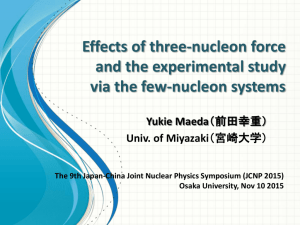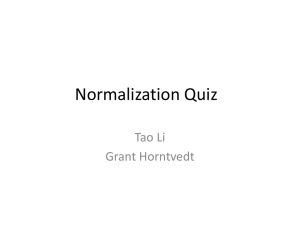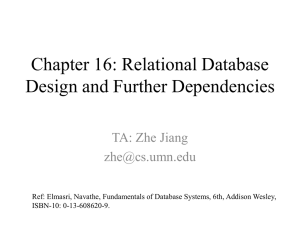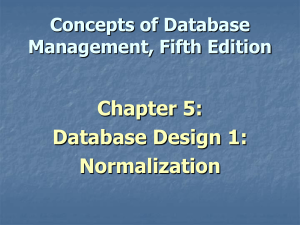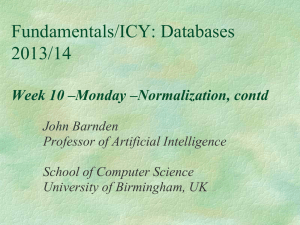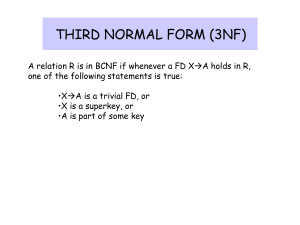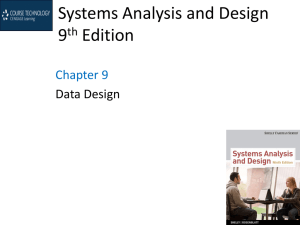Exploring Three-Nucleon Forces with Nucleon
advertisement
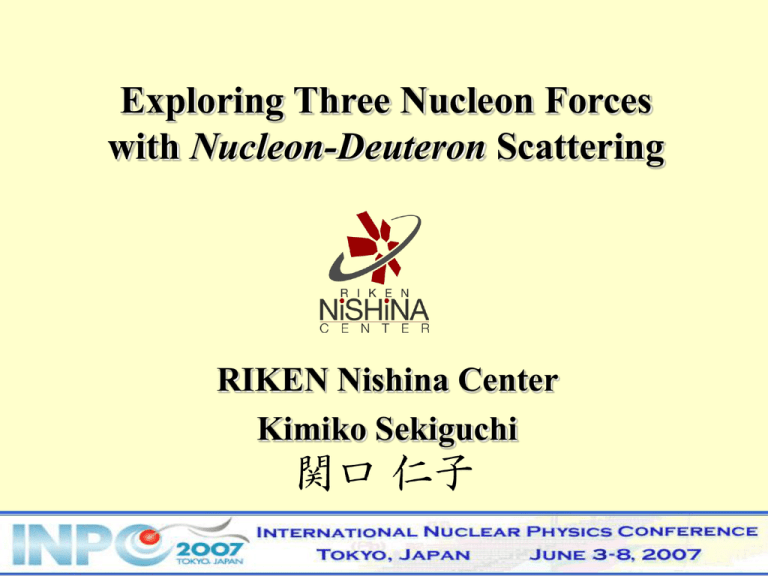
Exploring Three Nucleon Forces with Nucleon-Deuteron Scattering RIKEN Nishina Center Kimiko Sekiguchi The Tao produced One, One produced Two, Two produced Three, and Three produced All things. “Tao-te Ching“ by Lao Zi in B.C. 400 To explore the laws of the nature, step in 1 → 2 → 3 . To explore the laws of the nature, step in 1 → 2 → 3 . Earth-Moon-Satellite Gravitational Interactions Two Body Interactions : Gravity Three Body Interactions by the polarizations of the ocean water of the earth by the moon’s gravity To explore the laws of the nature, step in 1 → 2 → 3 . Triplets of Atoms Van der Waals Type Three Body Force Two Body Interactions : Gravity Three Body Interactions Effects of the polarizations of the electron density distribution Are there three nucleon forces in Nuclei ? Nucleus : a compact system of nucleons Nuclear Force : Strong Interactions Effects of Three Nucleon Forces – Where and How to attack- ? Before Three Nucleon Force Two Nucleon Force (2NF) 1935 Yukawa’s meson theory (2NF) Theory : One Pion Exchange Model One Boson Exchange Model Heavier Meson Exchange e.g. r, w Experiment : Nucleon-Nucleon (NN) Scattering Data Set (ds/dW and Spin Observables) Deuteron Properties 1990’s Realistic Modern NN Force CDBonn, AV18, Nijmegen I,II,93 reproduce 3500 exp. NN scattering data with high precision, c2 1 Three Nucleon Force (3NF) 1957 Fujita-Miyazawa 3NF Prog. Theor. Phys. 17, 360 (1957) N 2p-exchange 3NF : - Main Ingredients : D-isobar excitations in the intermediate N N D : excited state of nucleon Tucson-Melbourne (TM) Urbana IX Brazil, Texas etc… m Δ c 2 1232 MeV 3 3 π J , T , 2 2 Where could we see 3NF effects ? - I Ab Initio Calculations for Light Nuclei (A<10) Green’s Function Monte Carlo Ab Initio No-Core Shell Model etc.. 2NFs provide less binding energies 3NF : well reproduce the data - 3H, 3He, 4He by 2p-exchange 3NF (UR) - p-shell nuclei by 2p-exchange + 3p-ring with D-isobar 3NF Effects in B.E. 10 – 25 % attractive S.C. Pieper PRC 64,014001(2001) Where could we see 3NF effects ? - II Equation of State for Nuclear Matter •All NN potentials (AV18, Nijmegen I,II, CD Bonn) provide larger saturation point of Nuclear Matter. •3NF - shift to the empirical saturation point - significant at higher density A. Akmal et al., PRC 58, 1804(’98) • Understanding of 3NF is one key element to describe nuclear phenomena. • How to constrain the properties of 3NF ? Nucleon-Deuteron Scattering is a good probe to study the dynamical aspects of 3NFs. Momentum dependence Spin dependence Iso-spin dependence : only T=1/2 How to Extract 3NF Effects in Nucleon-Deuteron (Nd) scattering? Nd Scattering – three nucleon unbound system Direct Comparison between Theory and Experiment Theory : Faddeev Calculations Rigorous Numerical Calculations of 3N System 2NF Input 3NF Input 2NF & 3NF Input • CDBonn • Argonne V18 (AV18) • Nijmegen I, II, 93 • Tucson-Melbourne • Urbana IX • Nucleon & D isobar by coupled channel • Chiral Effective Field Pot. Experiment : Precise Data ds/dW, Spin Observables (Aij, Kij, Cij) → Extract 3NF effects Where is the Hot Spot for 3NF Effects in Nd scattering? Predictions by H. Witala et al. (1998) Cross Section minimum for Nd elastic scattering at Intermediate Energies (E/A~100 MeV) Nd scattering Low Energy Intermediate Energy NN 3NF NN 3NF Forward Backward 3NF q =0 ~ 4 fm-1 Nd Scattering at Low Energies ( E ≤ 30 MeV/A ) High precision data are explained by Faddeev calculations based on 2NF. No signatures of 3NF. Exp. Data from Kyushu, TUNL, Cologne etc.. W. Glöckle et al., Phys. Rep. 274, 107 (1996). Intermediate Energies (E = 100 ~ 200 MeV/A) Precise Measurement of dp scattering at RIKEN Accelerator Research Facility dp Elastic Scattering 1 Differential Cross Section and All Deuteron Analyzing Powers (Ay , Ayy , Axx , Axz) at 70, 100, 135 MeV/A - Whole Angular Range : q c.m. = 10°-180° 2. Deuteron to Proton Polarization Transfer Coefficients at 135 MeV/A - Double Scattering Experiment : Measurement of Polarizations of Recoil Protons - Angular range : q c.m. = 90°-180° - Strong sensitivities to Three Nucleon Force dp Breakup Reactions - Extension from Elastic to Breakup - Limited kinematical configurations : sensitive to 3NF - First measurement of Polarization Transfer Coefficient RIKEN Accelerator Research Facility K70 AVF cyclotron K135 Ring cyclotron AVF + Ring cyclotrons pol. d beams 65 ~135 MeV/A Beam Intensity : 200 pnA Polarized Ion Source Spin symmetry axis of polarized d beams is freely controlled ! Spin axis is controlled by Spin Rotator prior to acceleration. Single-turn extraction feature of RARF maintain the polarization amplitudes Beam polarizations : 60-80% Wien Filter (Spin Rotator) Beam Line Polarimeter By d+p Elastic Scattering Focal Plane Polarimeter DPOL Swinger and Magnetic Analyzer with Rotator and Twister Target (SMART) CH2 / Liq.H2 DPOL / EPOL d Determination of Absolute Values of the Cross Section 1. d + p at 135 MeV/A (70 MeV/A) beam d H2+ 2. measure p + p 135 MeV (70MeV) Same Exp. Setup • Target CH2 • Faraday Cup • Detection System 3. Direct Comparison with NN phase-shift solution(SAID) pp scattering at 135 MeV Ratio = ds/dW(exp) / ds/dW (calc.) dp Elastic Scattering Differential Cross Section K. Sekiguchi et al. PRC 65,034003 (2002) Calculations by Bochum-Cracow Gr. 2NF (CDBonn, AV18, Nijmegen I,II) : Large discrepancy in Cross Section Minimum ( ~ 30%) 2p-exchange 3NFs (Tucson-Melbourne, Urbana IX) : Good Agreement Calculations by Hannover-Lisbon Gr. Coulomb Coupled channel approach with Nucleon&D-isobar : Good Agreement. Disagreement at very forward angles : Coulomb effects. A. Deltuva et al., PRC 68, 024005 (2003) A. Deltuva et al., PRC 71, 054005 (2005) Are there any other effects than 2p-exchange 3NF? Relativistic Treatment - would be significant at higher energies Calculations with Lorentz boosted NN potentials by Bochum-Cracow Gr. Kamada et al. PRC66,044010(2002) Relativistic effects are visible at backward angles, but small. Discrepancy in the Cross Section Minimum for dp Elastic Scattering comes from 2p-exchange 3NF. K. Sekiguchi et al., PRL95, 162301 (’05) dp Elastic Scattering Spin Observables Analyzing Powers & Polarization Transfer Coefficients Analyzing Power K. Sekiguchi. et al. PRC 65, 034003(2002) 2NF (CDBonn, AV18, Nijmegen I,II) : Large discrepancy in Cross Section Minimum 3NF (Tucson-Melbourne, Urbana IX, D-isobar) : Vector Analyzing Power Ayp : Good Agreement Tensor Analyzing Power Ayy : No superiority Polarization Transfer K. Sekiguchi. et al. PRC 70, 014001(2004) 3NF : Kxxy’–Kyyy’ : Good Agreement Kyy’ : Direction : O.K. Magnitude : not enough Spin Observables (Aij, Kij) : Not always explained by 2p-exchange 3NF ⇒ Defects of spin dependent parts of 3NF New Approach other than Meson Exchange Picture - Chiral Effective Field Theory - Interactions : p + Nucleon + contact terms (heavier mesons...) - Nuclear forces (2NF, 3NF, … ) and currents are derived in a consistent way. - Hierarchy of Nuclear Forces : 2NF > 3NF > 4NF The first 3NF appears in NNLO. 2NF 3NF 4NF Comparing the data with predictions based on cEFT pot. Calc. based on cEFT pot. (NNLO) is only available below 100 MeV/A. Reasonable agreement for all the measured data d-p at 70 MeV/A Calc. with cEFT Pot. (NNLO) by E. Epelbaum et al. Nd Elastic Scattering Data at Intermediate Energies ~1998 1998 ~ • Rich data set ds/dW & many spin observables from RIKEN, RCNP,KVI,IUCF • Many data exit at 135 MeV/A RIKEN RIKEN provided the first precise data set of ds/d W , Aij, Kij for dp Elastic Scattering at Intermediate Energies, especially 135 MeV/A. 2nd Step dp Breakup Reactions Nd Breakup Reactions 1st Step : Nd Elastic Scattering at Intermediate Energies 2nd Step : Nd Breakup Reactions at Intermediate Energies - Leading Channel at Intermediate Energies nd total cross section sbr > sel e.g. sbr ~ 2.5 sel at 135MeV/A - Rich Phase-Spaces - a large amount of kinematical configurations - Selectivity dp In-Plane Breakup Reaction at 135 MeV/A Which is better, Tucson-Melbourne or Urbana IX ? Kinematical Condition (q1,q2) = (28 – 32 deg, 31deg) f12 = 180° Near Final State Interaction Observables : d to p Polarization Transfer Coefficients : Kyyy’ Analyzing Powers : Ayd, Ayy, Axx, Axz Kyyy’ Ayd Axx 3NF : partly success, partly not. Kyyy’ shows superiority of Urbana IX. Summary Three Nucleon Forces (3NF) play essential roles to explain fundamental properties of nuclear phenomena, e.g. binding energies of light nulcei, EOS of nuclear matter. Nd Scatteing is a good probe to study the dynamical aspects of 3NF - Momentum & Spin dependence - . For iso-spin, T=1/2 only. Precise data of dp scattering at intermediate energies (E ~ 100MeV/A, q = 2~3.5 fm-1) : ds/dW and many spin observables Achievements of rigorous numerical three-nucleon Faddeev calculations based on 2NF+2p-exchange 3NF below p-threshold energies Direct comparison between Experiment and Theory Cross Section for dp Elastic Scattering : - Magnitudes of 3NF is O.K. - First Clear Signatures of 3NF Effects in 3N scattering Spin Observables for dp Elastic Scattering & Breakup Reactions - not always explained by 2p-exchange 3NF - require further study of detailed properties of 3NF New developments of theory – in progress Chiral Effective Field Theory Approach Treatment of Relativistic Effect Treatment of Coulomb Meson Exchange Picture – further ingredients of 3NF - r-r and p-r exchange 3NF Perspective of 3NF Study Momentum dependence Spin dependence Nd Scattering provide Fundamental Data/Theory of 3NF Higher Energies Full treatment of dp Breakup Reactions T=1/2 RIBF/RCNP Iso-spin dependence Hypernuclei Strangeness From NNN to YNN & YYN JPARC Neutron-rich Nuclei Iso-spin dependence of 3NF RIBF Acknowledgments : SMART Gr. Collaboration School of Science, University of Tokyo H. Sakai, K. Yako, S. Sakoda, H. Kato, M. Hatano, T. Saito, N. Uchigashima, H. Kuboki, M. Sasano, Y. Takahashi CNS, University of Tokyo T. Uesaka, T. Kawabata, S. Sakaguchi, Y. Sasamoto RIKEN N. Sakamoto, T. Ohnishi RCNP, Osaka H. Okamaura, A.Tamii, K. Suda TITech Y. Satou KVI N. Kalantar-Nayestanaki K. Ermisch Kyushu University T. Wakasa, Y. Maeda Saitama University J. Nishikawa, K. Itoh Theoretical Supports from Ruhr-Universität, Bochum W. Glöckle Jagellonian University H. Witała, J. Golak Kyushu Institute of Technology H. Kamada Forshungszentrum of Jülich A. Nogga Hannover University P.U. Sauer, S. Nemoto Lisbon University A. Deltuva, A. C. Fonseca University of Bonn / Forshungszentrum of Jülich E. Epelbaum, Ulf-G. Meißner Thanks for delivering excellent beams : Accelerator staff of RIKEN Nishina Center and RCNP. Thank you very much !
